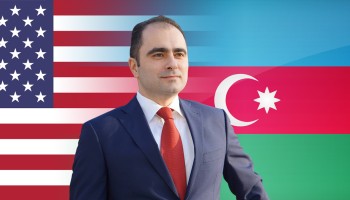The complaint alleges that the Republican US Representative Dana Rohrabacher, who represents California’s 48th district, and his top aide, Paul Behrends, violated the so-called Magnitsky Act, which was passed in 2012.
The full text of the complaint submitted by Hermitage Capital Management to the US Treasury’s Office of Foreign Assets Control was made public via a press release on Monday.
Hermitage Capital Management is an investment advisory firm headed by William (Bill) Browder, and the company for which Sergei Magnitsky – the namesake of the act – was contracted to work for as a jurist, a position in the Russian legal system similar to a lawyer which allowed the accountant and auditor to represent the company in legal proceedings.
In 2008, Magnitsky discovered a US$ 230 million tax fraud scheme that implicated Russian police officers and high-ranking Kremlin officials, including allies of President Vladimir Putin.
He was subsequently arrested by some of the same officials whose corruption he exposed and died a year later under suspicious circumstances in a Moscow jail.
Browder was the main proponent of the Magnitsky Act, which sought to punish Russian officials who the US held responsible for Magnitsky’s death by prohibiting them from entering the US or using its banking system.
One of the sanctioned officials is Victor Grin, Russia’s deputy general prosecutor. The new complaint alleges that Rep. Rohrabacher and his staffer Behrends started lobbying on Grin’s behalf after meeting with him in Moscow in April 2016.
The meeting’s occurrence was reported by Daily Beast on July 19, which prompted the complaint.
Reports that Rohrabacher accepted anti-Magnitsky Act materials from Grin also appeared in The New York Times and The Atlantic.
Following the Moscow meeting, Rohrabacher and Behrends allegedly undertook a series of repeated actions to undermine the Magnitsky Act and advocate for the sanctioned Russians, including Grin, the complaint says.
Those actions included purposefully delaying Congress’ consideration of the Global Magnitsky Act, while relying on talking points provided by Grin, introducing lobbyists working for Russian interests to US lawmakers, and organizing a private screening of an anti-Magnitsky documentary film at the Newseum in Washington, D.C., on June 13, 2016.
 Sergei Magnitsky (Photo: VOA, Public Domain)
Sergei Magnitsky (Photo: VOA, Public Domain)
Rohrabacher originally requested permission to screen the film during a congressional hearing, The Atlantic reported. That request was denied by the House of Representatives’ Foreign Affairs Committee Chairman Ed Royce.
But Rohrabacher was allowed to propose a witness for a full committee hearing held on June 14, 2016: "U.S. Policy Toward Putin’s Russia." He selected Jack Matlock, the former US ambassador to the Soviet Union, who Daily Beast reported also holds pro-Russia views.
Media attention shifted to Rohrabacher and Behrends’ alleged actions against the Magnitsky Act after The New York Times broke the story about the previously undisclosed meeting between Donald Trump Jr., Jared Kushner, Paul Manafort and the Kremlin-connected lawyer Natalia Veselnitskaya on June 9, 2016.
Emails released by Trump Jr. show he agreed to the meeting with Veselnitskaya after being promised damaging information on Hillary Clinton. In the emails, British entertainment promoter Rob Goldstone said the overture came after a meeting between Azerbaijani-Russian oligarch Aras Agalarov and the "Crown prosecutor of Russia."
Russia does not have a crown prosecutor, leading many to conclude the reference was intended to describe Russia’s prosecutor general, Yuri Chaika. Grin, the official who met Rohrabacher and Behrends, is a subordinate of Chaika.
However, when the existence of the June 9 meeting was first reported, Trump Jr. and the former White House Press Secretary Sean Spicer claimed that adoption policy was the only agenda item.
The Magnitsky Act is tied up with the adoption of Russian children by Americans, which Russia suspended as retaliation for the act’s passage.
As a result, discussions about adoptions are closely linked to talk on sanctions. The New York Times claims that "adoptions" is a code word for "sanctions."
Veselnitskaya has made a name for herself through her legal work attacking the Magnitsky Act. She was also one of the promoters of the anti-Magnitsky film, and attended the June 13 screening set up by Rohrabacher’s office, according to Daily Beast.
Veselnitskaya also dined with Rohrabacher, his hand-picked witness Matlock, Behrends and Rinat Akhmetshin, a Russian lobbyist who also attended the June 9 meeting with Trump Jr., after the committee hearing on June 14, according to the outlet.
Browder told OCCRP that he expects the Treasury to carefully review Hermitage’s allegations against Rohrabacher and Behrends, and to take punitive action if the details are confirmed.
 Bill Browder speaking at the World Economic Forum in 2011 (Photo: World Economic Forum, CC BY-SA 2.0)
Bill Browder speaking at the World Economic Forum in 2011 (Photo: World Economic Forum, CC BY-SA 2.0)
"Our experience with the Treasury sanctions team is that they are serious and apolitical when it comes to sanctions violations," he said.
When asked about the mounting incriminating evidence tying Trump’s administration to Russia, Browder said, "The one thing we can say for certain in the meantime is that the Kremlin used every KGB tool in the book to influence our political process and create political chaos."
On July 20, one day before Browder’s complaint was filed, and after media exposed Behrends’connections to pro-Russia lobbyists, he was fired as the staff director for the House Foreign Affairs subcommittee, The Hill reported.
For his part, Rohrabacher has criticized Browder for the allegations.
"Why would a billionaire tax exile want to prevent a US congressman from receiving both sides of an issue currently before Congress?" Rohrabacher’s spokesman Ken Grubbs said, Business Insider reported.
"Attempts to intimidate a member of Congress not to look at both sides is suspicious in and of itself."
The US House of Representatives overwhelmingly voted to approve new sanctions on Russia Tuesday, despite opposition from President Trump, Reuters reported.
Rohrabacher voted in favor of the sanctions.






